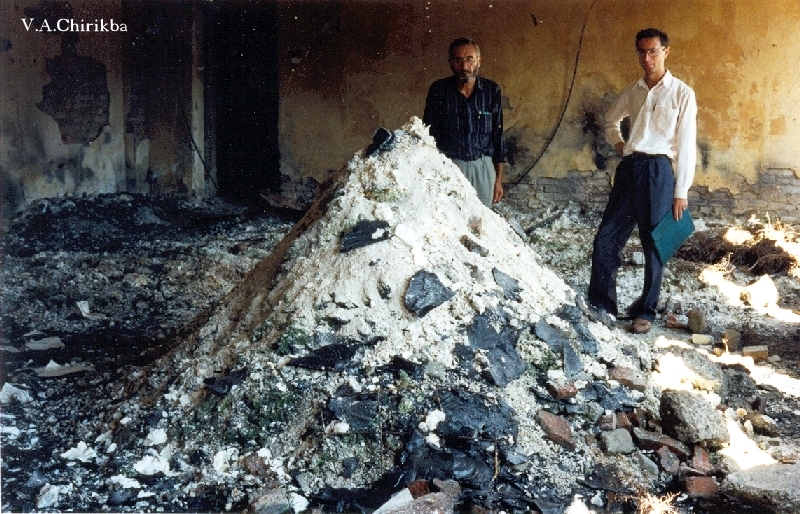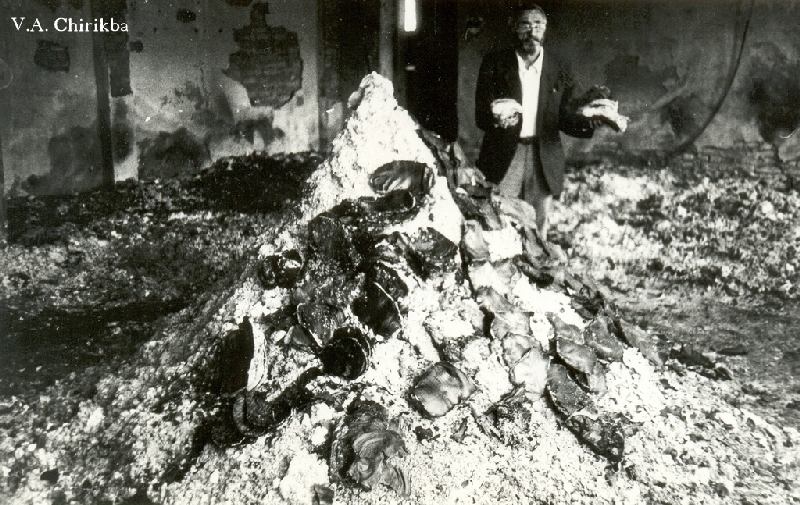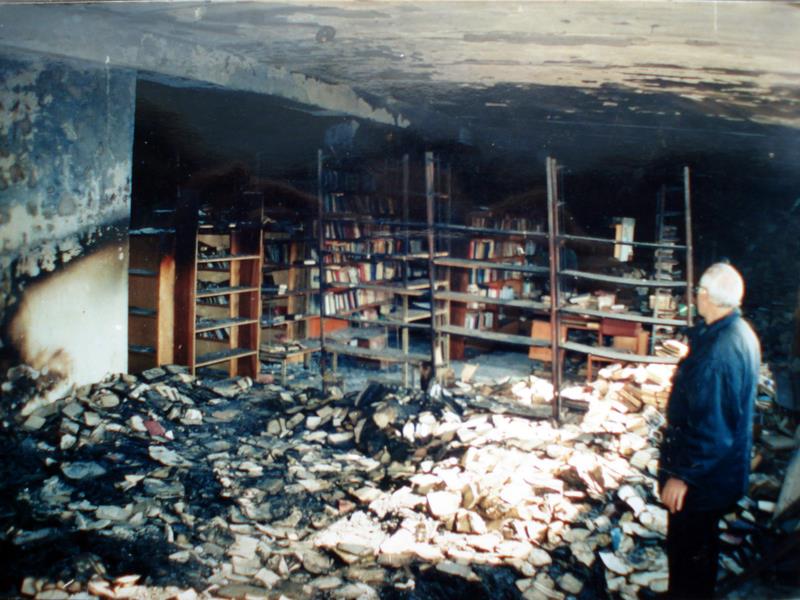History on fire: how to restore the state-archive of Abkhazia
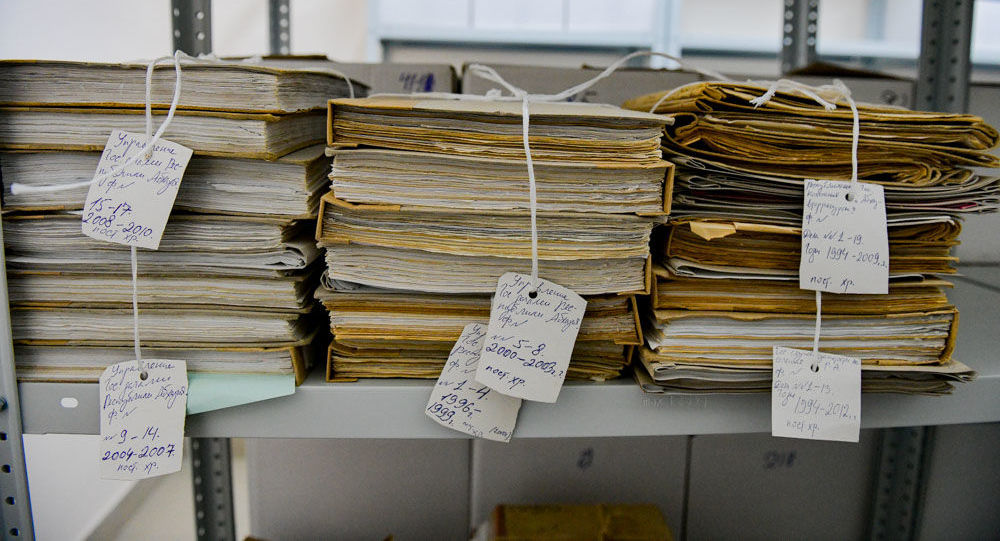
Georgian troops set fire to the building of the state-archive of Abkhazia on 22 October 1992. Eye-witnesses of this tragic event told Sputnik how the “history” was burning, what documents were lost forever, and what was able to be saved and restored.
The modern history of the Abkhazian archive begins in May 1921 when an order was issued in the republic that all private individuals who possess archival documents must submit them to the office of the Commissariat for Internal Affairs of Abkhazia.
Already in the first days of the Patriotic War of the people of Abkhazia, Georgian troops set themselves a goal - to burn all the historical documents of the republic stored in the archive. On 22 October 1992, the Georgian military set fire to the archive-building. At that time, 176 thousand 343 cases in 673 funds were registered in permanent storage; 160 thousand cases were destroyed. Most of the documents were in the central building, which was completely burned down.
The destroyed documents relate to the years 1810-1980. However, part of the archival documents had already been published in collections, thereby saving them for posterity.
"The destruction of the archive was a huge shock for me, as for all scholars; I myself collected archival documents at AbIGI [the Abkhazian Research Institute for History, Language and Literature – ed.], so I knew what kind of labour was involved," said Roman Gvindzhia, head of the Office of the State-Archive of Abkhazia.
Recently deceased scholar Arvelod Kuprava, who worked for many years in the archive, some years ago in an interview with Sputnik/Abkhazia shared his memories of that difficult day for all.
"I started working in the archive as a student. The head provided us with the central archive rooms. I published two collections of documents on the history of Soviet Abkhazia, working in this archive, and prepared three more for publication. In October 1992, they announced that they had burned the archive together with ABIGI. I went to the archive and stood near the burned-out building fully conscious that we had irrevocably lost valuable documents," said Kuprava.
+ Abkhazia's archive: fire of war, ashes of history, by Thomas de Waal
+ Vandals of the end of the XXth century, by Ermolay K. Adzhindzhal
+ Interview with Boris Cholaria, Director of the National Library of the Republic of Abkhazia
How to recreate the archive
In the reconstruction of the archive after the Patriotic War of the people of Abkhazia Nikolai Ioanidi, who worked for many years in the archive of Abkhazia, played a major role.
“Immediately after the war, the archive was headed by Nikolai Ioanidi. Then the archivists who were left, mostly of the older generation, did a lot of work. There were few young people at that time. Then Ioanidi called me to work, but I refused. Vladislav Ardzinba learned of this and told me that, if he had a choice, he would not be engaged in politics, but in scholarship. He insisted that I start working in the archive, and I agreed,” were the memories the archive-director shared.
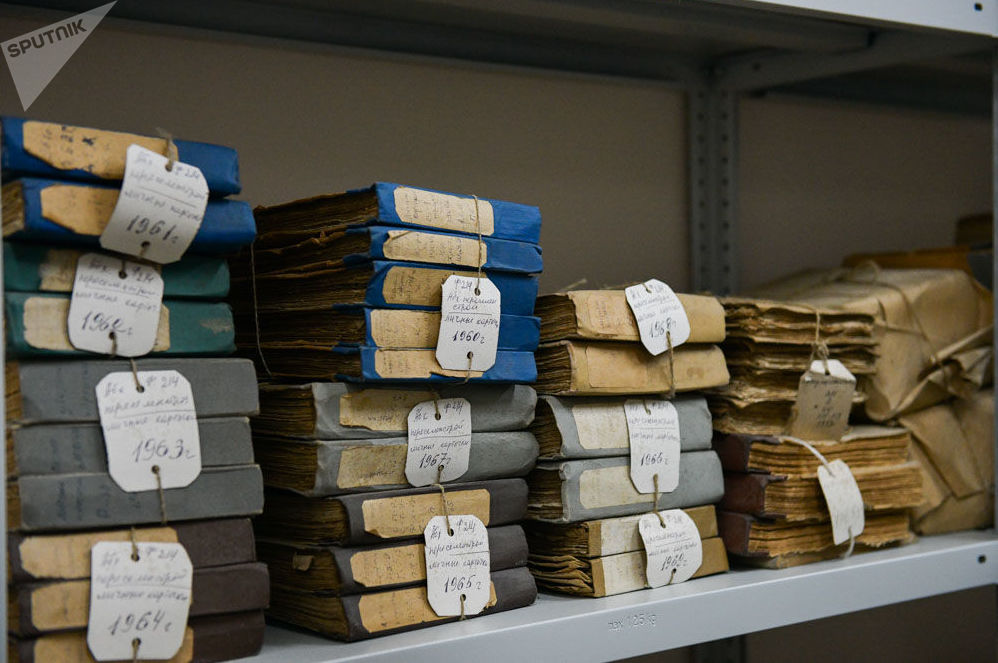
In the reconstruction of the archive after the Patriotic War of the people of Abkhazia, Nikolai Ioanidi, who worked for many years in the archive of Abkhazia, played a major role.
According to Roman Gvindzhia, working in the post-war period was especially difficult: there were not enough personnel, there were poor conditions for storing documents, and, of course, wages were very low
Not everything is lost
The fire, lit on 6 June 1993 by Georgian guards in the Abkhaz State-Archive, is called a flagrant act of vandalism.
However, by a lucky chance, not everything was irretrievably destroyed.
“The archive was located on what is currently Abazinskaja Street; the main building was there, and two churches were nearby, in which documents were also stored. But the main documents on paper were stored in the main building, which was set on fire. This news was a real tragedy for all Abkhazians because they tried to eradicate our past, our history. But ,when the Georgians set the archives on fire, they did not take into account one nuance: before the war in Abkhazia, especially valuable documents were stored not only on paper — microfilms and photocopies had been created. These were kept on discs in these very churches. Thus it was that by such a lucky chance many documents were preserved," Roman Gvindzhia, chief archivist of Abkhazia, continued the story.
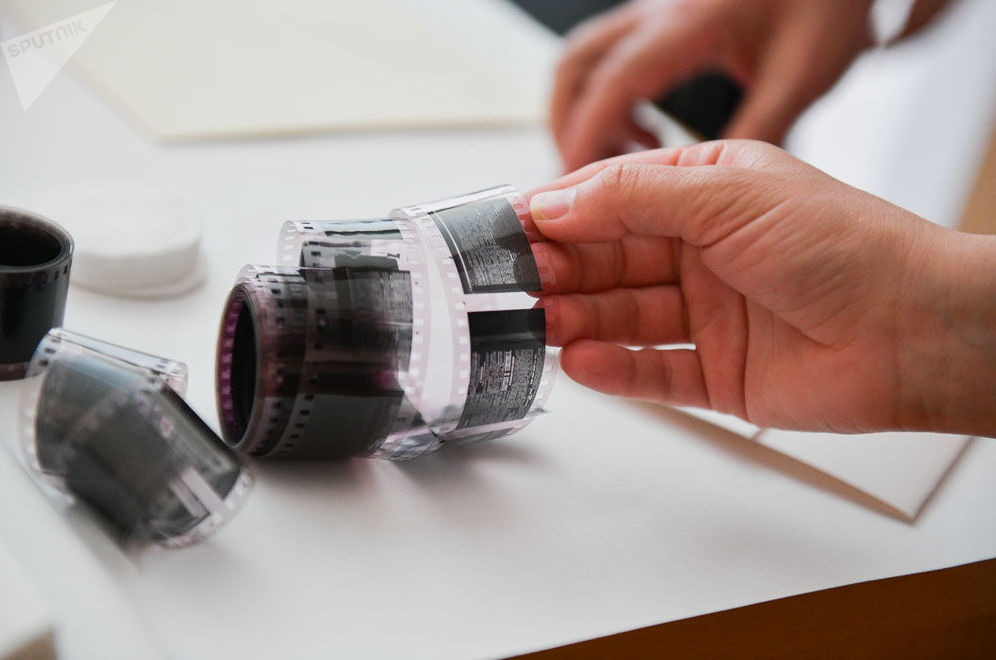
At first, until there was special equipment, students restored films using improvised tools.
After the war in Abkhazia, for a long time they could not decipher the films. There were no specialists or the necessary equipment. As to how many documents survived, the archivists did not even have an idea. All inventories of digitized materials were burned.
Bit by bit
But time did not stand still — the films deteriorated. Not so long ago, the question of restoring the archive of Abkhazia, including the decoding of digital media, was raised at the Geneva Discussions on Security and Stability in the South Caucasus.
“This issue was positively accepted in the European Union. Under the rubric of the Geneva Discussions the State Archive of Abkhazia is being equipped with technical equipment. Initial equipment is already in place. We proposed involving specialists from the Czech Republic, as some of the best archival specialists are located there — specialists from Prague. We selected students from our State University who were specially trained in restoration-techniques. Now these students work on our staff," said Roman Gvindzhia.
At first, until there was special equipment, students restored films using improvised tools. They even built a disinfection-chamber for the restoration of films.
Now the contents of the films are read using special equipment. After decryption, the materials are scanned, and the restored photographic tapes are stored in special boxes and in a separate room where the necessary temperature conditions are maintained.
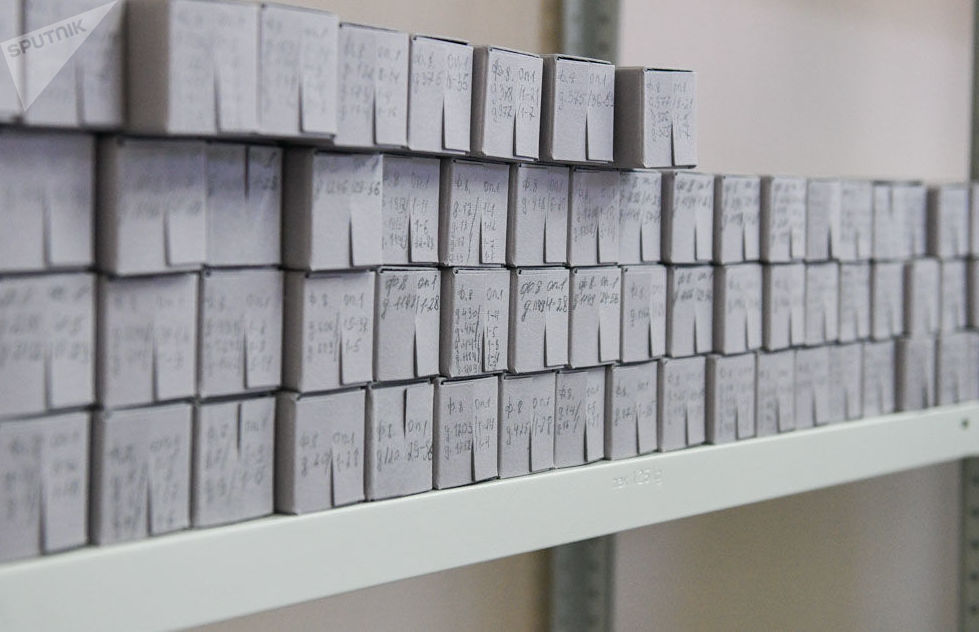
Photographic tapes are stored in special boxes and in a separate room.
Over a year and a half, over four thousand materials were restored in the State Archive. Two funds have already been collected from them - the People's Commissariat of Education and the Council of People's Commissars. Many documents are listed on the "Unknown materials." They have yet to be explored.
Now the contents of the films are read using special equipment. After decryption, the materials are scanned, and the restored photographic tapes are stored in special boxes and in a separate room where the necessary temperature conditions are maintained.
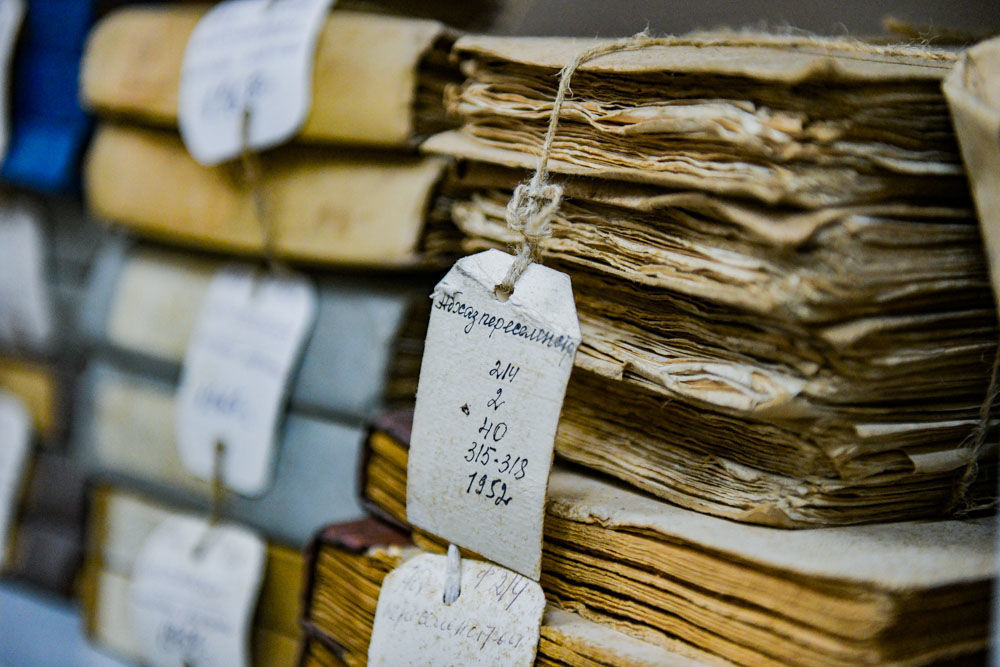
Anyone can go to the archive website, remotely send a request for the material of interest, and after a certain time come to the State-Archive for the said document.
Over a year and a half, over four thousand materials were restored in the State-Archive. Two funds have already been collected from them — the People's Commissariat of Education and the Council of People's Commissars. Many documents are listed on the "Unknown materials." They have yet to be explored.
The World under Lock and Key
Typically, archives are considered closed institutions in which a dossier is stored. But Roman Gvindzhia and his deputy, Dmitrij Enik, are trying to make the institution open and convenient.
Associated with the State-Archive, a library and a reading room were created, which are equipped with computers. In the reading room there is even a special room for especially important visitors who have access to secret documents.
Anyone can go to the archive-website, remotely send a request for the material of interest, and after a certain time come to the State Archive for the said document.
“We facilitate the work of our visitors. You can send an application in advance, and documents will be waiting for the visitor at the appointed time. In other words, the visitor thereby saves his time. Almost all documents that are available in the State-Archive have been transferred to digital media today. Previously, we handed over the documents, but paper spoils from constant use. Therefore, everything is being digitized. Unfortunately, we can’t answer some requests, since the main part of the documents were burned, and a lot has not yet been restored," explained Dmitrij Enik.
There is a myth that archives are boring institutions in which dry protocols are kept. But one can argue with that. What could be more interesting than information with limited access? The Abkhazian State-Archive has documents that are classified for secrecy.
Usually, after 75 years, the privacy stamp is removed from all materials. But there are documents that, according to the chief archivist of Abkhazia, it is better not to declassify.
"For example, to the present day in the United States many documents on the Civil War have still not declassified, and in Russia those on the Caucasus. Abkhazia also has top-secret materials. At one time, Vladislav (Vladislav Ardzinba, first president of Abkhazia — ed.) obtained documents from the KGB about the repressions. They could already have been published at that time. But Vladislav didn’t want to do it, because there are denunciations by neighbours of neighbours. This can incite hatred between people. Several generations must pass before such materials can be declassified," Roman Gvindzhia waged.
Today, the State-Archive is located in the reconstructed building of the former Pedagogical Institute of Abkhazia. Despite the lack of equipment and the lack of personnel, the building has created conditions for storing archival documents for many years.
This article was published by Sputnik Abkhazia and is translated from Russian.
